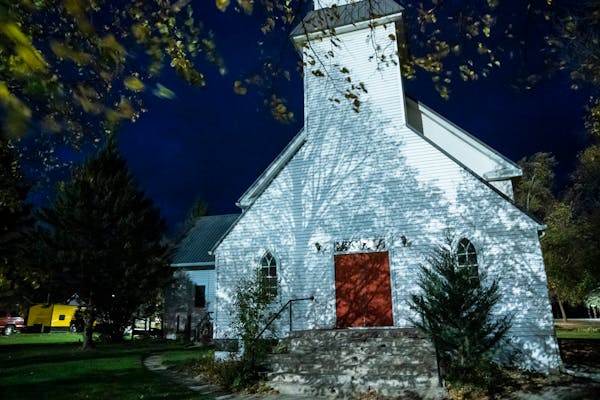An anonymous City Council vote on allowing a white supremacist church to locate in Murdock, Minn., violated the state's open meeting law.
That's according to several experts and to the language of the law itself, which states that local governments meeting remotely must vote by individual roll call, so that their audience can clearly understand how each member voted.
The Murdock city attorney called the council's action "a matter of interpretation" and said the group had no intention of obscuring its actions. The meeting's minutes, published Thursday, included how each member voted.
Under Minnesota's open meeting law, during a remote meeting "all votes must be 'conducted by roll call, so each member's vote on each issue can be identified and recorded,' " said Leita Walker, a media law attorney in Minneapolis, quoting from the statute. "The [Murdock] City Council violated the law."
On Wednesday, the Murdock council voted to grant a conditional use permit to the Asatru Folk Assembly (AFA), a Nordic heritage religion that has been identified as a white supremacist organization by religious scholars as well as by other heathen religious groups.
The AFA bought an abandoned Lutheran church in the Swift County town of 275 residents and plans to make it a Midwest hub for its activities. The group's arrival in Murdock has sparked protests by area residents opposed to its views, which are explicitly pro-white.
Citing the COVID-19 pandemic, the council held the meeting on Zoom, a remote video networking service. The council didn't turn on its camera, meaning it wasn't possible to see the members. The Minnesota law governing video conferences says the public must be able to see and hear a meeting, but Matt Ehling, a board member of the Minnesota Coalition on Government Information, a nonprofit that works for open government, said that when the video was turned off, it became a teleconference. That is not illegal.
But when the members voted, it was a voice vote: All in favor say, "Aye," all opposed say, "Nay." That's the part that went against the law, Ehling said.
"It's an important transparency provision," he said. "In these remote meetings, it's difficult to tell who's speaking sometimes, and particularly to tell who's voting."
Ehling said the law provides for a civil fine of up to $300 on members of a government body who violate the open meeting law. If an individual or a body violates the law three separate times, a petition could be brought to remove them from office.
Don Wilcox, the Murdock city attorney, said council members "don't feel like they broke the law."
"They honestly weren't trying to exclude anybody or not be transparent," he said. "This is a small-town council and they're doing the best they can."
After the voice vote during Wednesday's meeting, several audience members asked repeatedly for a vote tally by name, but council members ignored the request, pushing forward with other items on their meeting agenda.
Wilcox said there's a question about whether the vote requirement covers meetings where all council members are physically present, even though the public may be excluded. He indicated that the voting requirement is intended to apply to situations where members can't be physically present together but may be taking part by phone or other electronic means.
"I think it's a matter of interpretation," he said.
Kim Diederich, the Murdock city clerk, published the minutes of the meeting on Thursday that show council members Jim Diederich, Pat Thorson and Kelly Demuth voted to grant the church permit. Steph Hoff voted against it.
Kim Diederich denied that the council violated the law by withholding the individual votes.
"We were told that we could do that at the end of the meeting by typing up the minutes and distributing them, which we did," she said. But the minutes weren't published until the next day.

Four Minnesotans catch salmonella in outbreak linked to basil sold at Trader Joe's

Rep. Omar's daughter arrested, suspended from college for pro-Palestinian protests
Hopkins parents charged in 9-year-old daughter's asthma death

Back to blue: Lake Harriet Band Shell renovation almost finished

